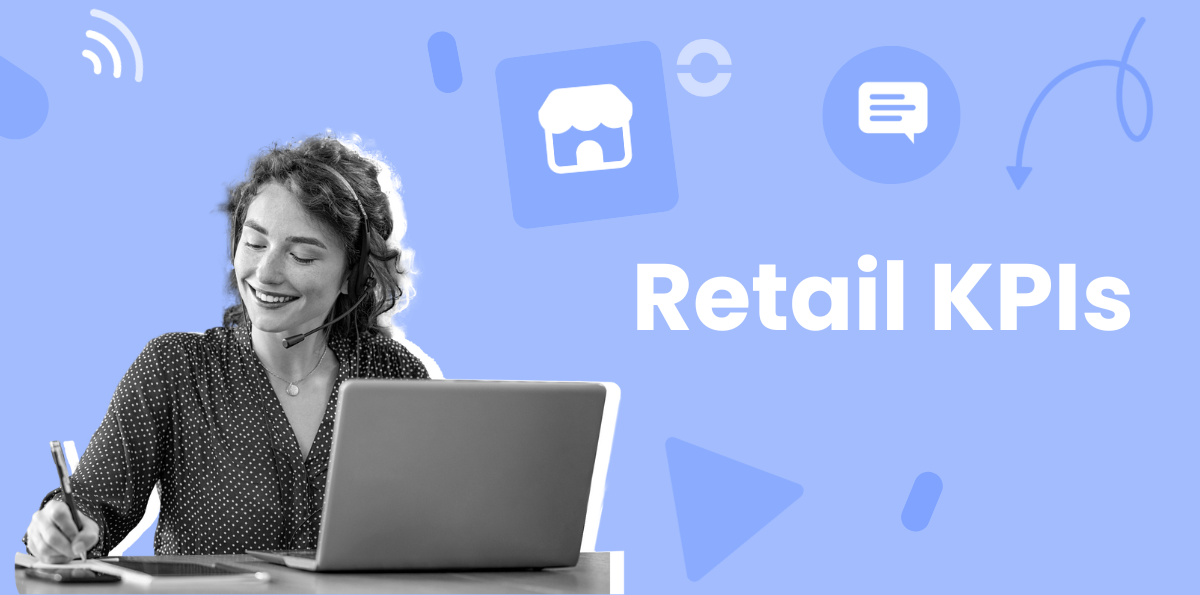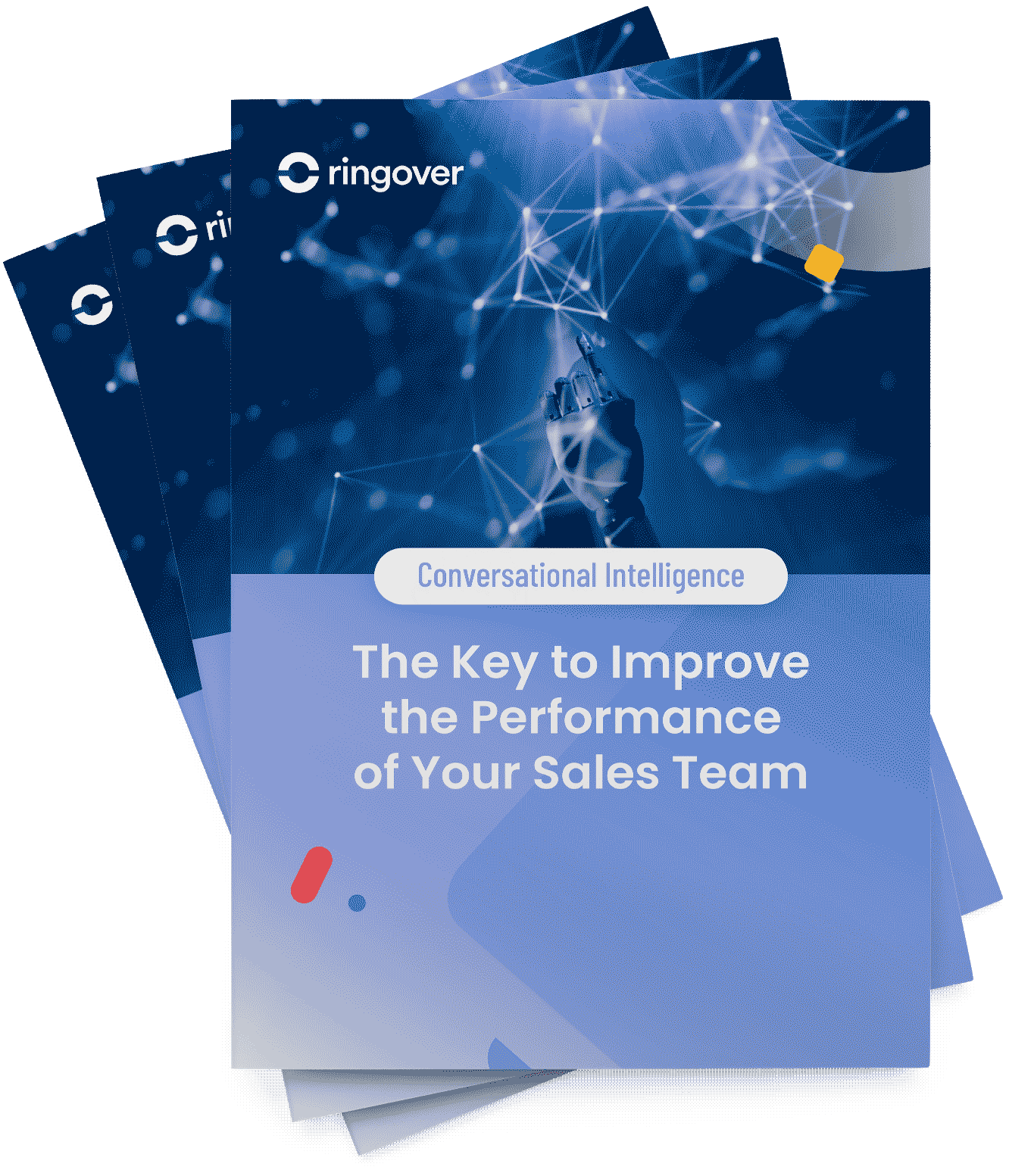Summary
These KPIs measure vital aspects such as productivity, efficiency, and costs, enabling retailers to make strategic decisions to optimise sales and enhance the customer experience.
The following lines explore key KPIs as well as the impact of advanced technologies such as cloud telephony and artificial intelligence on these indicators.
Essential KPIs for the Retail Industry
Key performance indicators (KPIs) in the retail sector are grouped into several vital categories to measure the health and performance of a retail business. These categories include sales performance, customer engagement, inventory management, and financial health.
KPIs for Sales Performance
1. Sales Growth Rate
This KPI evaluates the increase in sales over a defined period compared to a previous period, allowing an assessment of the effectiveness of sales and marketing strategies.
2. Sales per Square Foot
This indicator measures the profitability of the sales space by comparing the revenue generated in relation to a given area, helping to optimise product placement and promotions.
3. Conversion Rate
This KPI calculates the percentage of visitors who make a purchase, essential for evaluating the effectiveness of sales and marketing strategies.
4. Average Transaction Value (ATV)
This indicator provides an average of the amount spent by a customer during a transaction, useful for understanding purchasing habits and the effectiveness of upselling strategies.
KPIs for Customer Engagement
5. Customer Retention Rate
Customer retention rate measures the percentage of customers who continue to purchase or interact with the brand over a given period, essential for assessing the effectiveness of customer loyalty strategies.
6. Customer Satisfaction Rate (CSAT)
The customer satisfaction rate, often abbreviated as CSAT (for "Customer Satisfaction Score"), is a key measure used by companies to evaluate the level of satisfaction of their customers with a product, service, or specific experience.
7. In-Store and Online Traffic
This indicator tracks the number of visitors in physical stores and on the website, providing insights into the effectiveness of marketing campaigns and the attractiveness of the stores.
Retail KPIs for Inventory Management
8. Inventory Turnover
This KPI, also known as Days Sales of Inventory (DSI), measures the speed at which inventory is sold and replenished. It is crucial to avoid stockouts and overstocking.
9. Sell-Through Rate
This indicator evaluates the percentage of products sold compared to the quantities received, helping to adjust product orders based on demand.
Financial Health
10. Cost of Goods Sold (COGS)
This indicator measures the direct costs associated with the production of goods sold, crucial for evaluating the profitability of sales.
11. Gross and Net Profit
These indicators calculate the profit before and after deducting operational costs and taxes, allowing for the evaluation of the company's overall profitability.
An omnichannel contact centre software allows you to effortlessly keep in touch with customers via their preferred channel.
Cloud Telephony and AI – How Do These Technologies Impact Retail KPIs?
Cloud telephony and artificial intelligence (AI) are radically transforming the methods of analysing and managing performance indicators in the retail sector. They offer innovative tools to increase efficiency, accuracy, and speed in business decision-making.
The adoption of cloud telephony in the retail sector can significantly impact several Key Performance Indicators (KPIs). By optimizing internal and external communications, cloud telephony helps improve overall performance, customer experience, and operational efficiency. Let's examine how it affects various important retail KPIs:
The Impact of Cloud Telephony on Retail KPIs
Customer Satisfaction Rate (CSAT)
Cloud telephony can improve CSAT by simplifying and making the communication process with customers more efficient. With features like intelligent call routing and automated responses, customers can receive fast and accurate assistance, which tends to increase their satisfaction.
Call Abandonment Rate
Call queue management systems and skill-based call routing, common features in cloud telephony solutions, can help reduce the call abandonment rate by ensuring that customers are quickly connected to the right person.
Conversion Rate
By providing staff with tools that facilitate better access to customer information (such as integration with CRM systems), VoIP phones can enhance the ability to convert interactions into sales, personalised offers, etc., thereby positively influencing conversion rates.
Impact on Operational Efficiency KPIs
Operational efficiency can be tracked through indicators such as cost per call, employee productivity, or the time required to resolve a customer request.
Cloud telephony can help improve these KPIs due to its generally lower cost compared to traditional systems, as well as the optimization of communication processes.
Customer Retention
By providing a high-quality customer experience, cloud telephony plays a role in customer retention. Positive and efficient interactions can encourage customers to return, which is reflected in the customer retention rate.
The Contribution of AI and Its Impact on Retail KPIs
Improvement of Data Analysis
The combination of cloud telephony and AI fosters deeper and faster data analysis. Cloud analytics tools automatically process large amounts of data, offering valuable insights into purchasing behaviours, sales trends, and customer satisfaction.
Data storytelling platforms and guided analytics, for example, allow retailers to better manage their inventory by clearly visualising data and identifying best-selling and slow-moving products.
This can also be achieved through the use of conversational analysis tools that identify patterns and trends in interactions between customers and the company, regardless of their nature.
Process Automation
AI can automate many repetitive tasks, allowing teams to focus on more strategic initiatives. Chatbots and virtual assistants, for instance, can handle basic customer interactions, reducing response times and improving overall satisfaction. Additionally, AI is useful for predicting sales and optimizing promotions by analysing historical data and current trends.
Personalisation of the Customer Experience
Cloud telephony and AI significantly enhance the personalisation of the customer experience. By analysing purchasing behaviours and phone interactions between a company and its customers, AI systems can offer tailored recommendations, thereby increasing the average transaction value and conversion rate.
AI-based recommendation systems, for instance, can suggest complementary products based on customers' previous purchases, enriching the shopping experience and boosting sales.
Optimization of Inventory Management
AI also plays a key role in optimizing inventory management by forecasting demand and adjusting stock levels accordingly. Cloud analytics tools enable real-time inventory tracking, identify slow-moving products, and optimise orders to prevent stockouts and overstocking.

Practical Cases – The Impact of New Technologies on Retail Performance
Retail companies that adopt cloud telephony and artificial intelligence (AI) see a significant improvement in their performance and key success indicators. Let's explore concrete examples demonstrating the beneficial effects of these technologies on retailers' KPIs.
Example 1: Optimization of Inventory Management with AI and IoT Technologies
Companies can use AI and IoT technologies to perfect their inventory management. Through the use of RFID tags and IoT sensors, it is possible to monitor inventory in real-time and adjust orders optimally.
This method helps reduce cart abandonment rates and increase product availability, which can lead to sales growth.
Example 2: Integration of Online and Offline Channels with Omnichannel Strategies
Companies can implement an omnichannel marketing strategy, merging their online and offline channels.
To achieve this, the simplest approach is to use cloud platforms like Ringover and CRM systems that facilitate customer data centralisation, offering a consistent and personalised experience across all touchpoints.
Conclusion
KPIs (key performance indicators) in the retail sector play a crucial role in evaluating and improving the performance of retail businesses.
By focusing on important indicators such as conversion rate, average transaction value, and inventory turnover, retailers can make strategic decisions to optimise their operations.
The adoption of advanced technologies like cloud telephony and artificial intelligence can enhance these efforts by refining data analysis, automating processes, and personalising the customer experience.
To stay competitive and achieve their business goals, retailers must embrace new technologies. If you're ready to take that step, why not try Ringover and Empower for free today?
Published on September 17, 2024.



